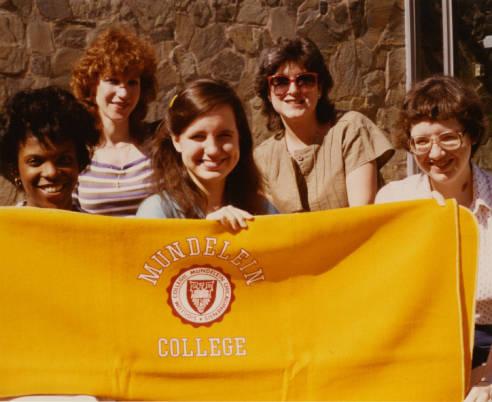1991: Mundelein's Affiliation with Loyola
Throughout the 20th century, Mundelein College and Loyola University Chicago enjoyed a long record of collaboration. They shared professors and campuses starting as early as 1930. Mundelein had been a formidable force in the movement to educate young women, but it saw a decline in enrollment beginning in the late 1970’s. This decrease was due mostly to the progressiveness of the late 20th century; women were now able to enroll at many of the colleges and universities that had once allowed only men. With enrollment down, Mundelein began working with their neighbor Loyola University Chicago to plan for the future. In the spring of 1991, they put the finalized plan into action, and the two universities merged.
The closing of Mundelein was an emotional time for students, faculty, and staff. Students of the college protested the merger, worried that their beloved college would be forgotten or ignored in Loyola’s overall history. However, they needn’t have worried; the students had a champion in Carolyn Farrell, BVM, the last president of Mundelein. During the negotiations, she ensured Mundelein’s legacy through the establishment of the Gannon Center for Women and Leadership at Loyola. Named for Ann Ida Gannon, BVM, a former president of Mundelein, the Gannon Center is “committed to women's leadership in a Catholic coeducational institution”. In addition, the Women and Leadership Archives, housed inside the Gannon Center, maintains the Mundelein Photo and Paper Collections, preserving Mundelein College’s history.
Mundelein has contributed more to Loyola than just the buildings it once occupied. One notable contribution is the Peace Studies Program, which was created out of a desire to develop female leadership in international peace initiatives. In addition to the courses offered on the nonviolence of Gandhi and Dr. Martin Luther King Jr., Loyola’s Peace Studies curriculum added courses on conflict and war as well as environmental violence. Today, the Peace Studies Minor focuses on three main pillars: international peacemaking, societal violence and conflict Resolution, and environmental violence and ecological concerns. Another Mundelein program, the Weekend College Program, dedicated to offering working women the opportunity to earn a degree by attending classes on the weekends, was combined with Loyola’s University College to create the School of Continuing and Professional Studies.
Loyola University Chicago’s commitment to educating students in the Jesuit tradition was enriched by acquiring Mundelein College. The programs that Mundelein contributed to Loyola University were a valuable addition to the rich curriculum of the University. In the almost thirty years since the affiliation, Mundelein’s legacy remains strong through the work of the Gannon Center, the Women and Leadership Archives, and, most importantly, the student leaders that Loyola has produced. (But also, Sister Jean!)

